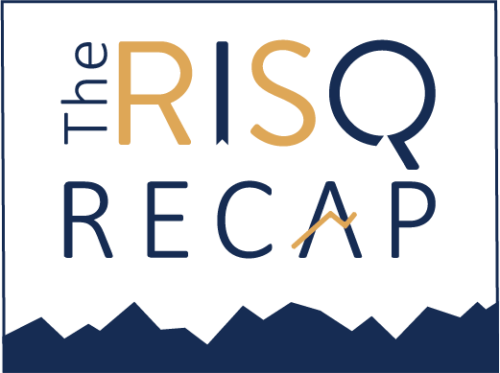
January 10 – 14, 2022
Each week, you’ll find specially curated news articles to keep you up to date on the ever-evolving world of insurance and risk management. The articles are divided out between items relevant to Property & Casualty, Employee Benefits/Human Resources, and Compliance. We’ve included brief summaries of each item as well as a link to the original articles.

PROPERTY & CASUALTY
2022 Set to be “Hangover” Year From 2021’s Cyber Epidemic
“Much of the cyber turmoil that plagued the world in 2021 will continue into 2022, with individuals remaining the top source of risk in an irrevocably online society, according to Experian’s annual Data Breach Industry Forecast for 2022. ‘In a sense, 2022 will be a sort of hangover from 2021’s cyberdemic,’ commented breach resolution firm in its report. ‘Since so much of our lives now take place online, the digitization of society means that our infrastructure, institutions and personal lives are more exposed than ever to malicious actors. Big institutions remain vulnerable, despite spending millions on security, and cybercriminals have plenty of opportunities to exploit weak technologies.’ ” Full Article
– Zywave

EMPLOYEE BENEFITS, HUMAN RESOURCES, & COMPLIANCE
Effectively Implementing Social Media Policies in the Workplace “The stated goal of the National Labor Relations Board (“NLRB”) is to ensure that employers are not violating Section 8(a)(1) of the National Labor Relations Act (the “Act”) by implementing a work rule that would “reasonably tend to chill employees in the exercise of their Section 7 rights.” In particular, the NLRB has focused on the precise wording and language used in employment handbooks. Although the NLRB’s yardstick in this area is apparently flexible rather than rigid, a careful understanding of applicable NLRB opinions can help employers regulate social media usage more effectively.” Full Article – Klein, Moynihan, Turco
Federal Contractors Must Ban the Box “The Fair Chance to Compete for Jobs Act of 2019 took effect on December 20, 2021 and requires agencies to include a clause in federal contracts that prohibits contractors from requesting, either verbally or in writing, the criminal history of an applicant for work under a federal contract until after a conditional offer of employment has been made. (The “box” refers to the box on many employment applications, which must be checked if the applicant has a criminal record). There are exceptions where a criminal background check prior to the offer is required by law, the position is related to law enforcement or national security duties, or the position has access to classified information.” Full Article – Shawe Rosenthal
Immigration Updates in COVID-19 Times “International borders have been closed for 18 months, U.S. embassies abroad have been operating at a limited capacity, and yet employers struggle to find and retain talent. Corporate immigration, including H-1Bs and other visas, continues to provide a solution for savvy employers. Here are the most important immigration changes within the last year.” Full Article – Holland & Hart
Coworking Spaces: COVID-19 Considerations “As workplaces are reimagined, employers and operators of coworking spaces need to consider how to operate safely in the age of the COVID-19 pandemic. – Jackson Lewis
Coworking spaces have become an intriguing work alternative for remote employees, hybrid workers, self-employed individuals, independent contractors, and others. Employers and operators of coworking spaces should consider such issues as the security of sensitive company or employee information and compliance with COVID-19 health and safety rules, among others.
” Full Article

STATE & INTERNATIONAL COMPLIANCE
In addition to the RISQ Review, RISQ Consulting also provides a resource that features changes and updates to State and International Compliance measures. We’ve included brief summaries of each item below, and also provided links to the original articles if you’d like to read further.
New York
New York Department of Labor Releases Final Regulations for State Sick Leave Law
“The New York Department of Labor issued final regulations regarding the New York State Sick Leave Law (NYSSLL), which has been in effect since September 30, 2020. The final regulations do not contain any changes to the rules initially proposed on December 9, 2020.” Full Article
– Littler Mendelson
Connecticut
Connecticut Paid Leave Payments and Connecticut FMLA Changes Coming January 1: What You Need to Know
“As we speed closer to January 1, the date when payments will begin der Connecticut’s Paid Family and Medical Leave Act and the effective date of changes to Connecticut’s Family and Medical Leave Act (CT FMLA), below are some updates and considerations for employers.” Full Article
– Jackson Lewis
Minnesota
A Blizzard of Activity from Minnesota OSHA in the New Year
“On January 3, 2022, Minnesota OSHA adopted the ETS by reference in the State Register. For Minnesota employers with 100 or more employees this means they must develop and implement a COVID-19 vaccination and testing policy by January 10, 2022. (MNOSHA indicated it will not issue citations for noncompliance with any requirements of the ETS before Jan. 10.) Further, employers must make the testing requirements of their policies operational by February 9, 2022.” Full Article
– Littler Mendelson
Washington
Washington Long-Term Cares Fund Update: Employers Advised to Withhold Premiums Starting January 1
“Governor Jay Inslee has clarified that, starting January 1, “employers will still be legally obligated to pay the full amount owed to state ESD Employment Security Department] to begin the long-term care program” under the Washington Long-Term Services and Supports Act, until the legislature changes the law.” Full Article
– Jackson Lewis
California
California Adopts New CDC Guidance Regarding Quarantine and Isolation Periods With Its Own Twists
“The California Department of Public Health (CDPH) released updated guidance to conform to the new CDC guidelines but added additional requirements, including testing to exit isolation or quarantine after the fifth day. Notably, the new guidance also introduces a distinction between boosted and non-boosted individuals for the first time.” Full Article
– Hunton Andrews Kurth





 Subscribe to the RISQ Recap, a weekly post to help you stay up to date on news articles and resources for your organization’s compliance needs.
Subscribe to the RISQ Recap, a weekly post to help you stay up to date on news articles and resources for your organization’s compliance needs.